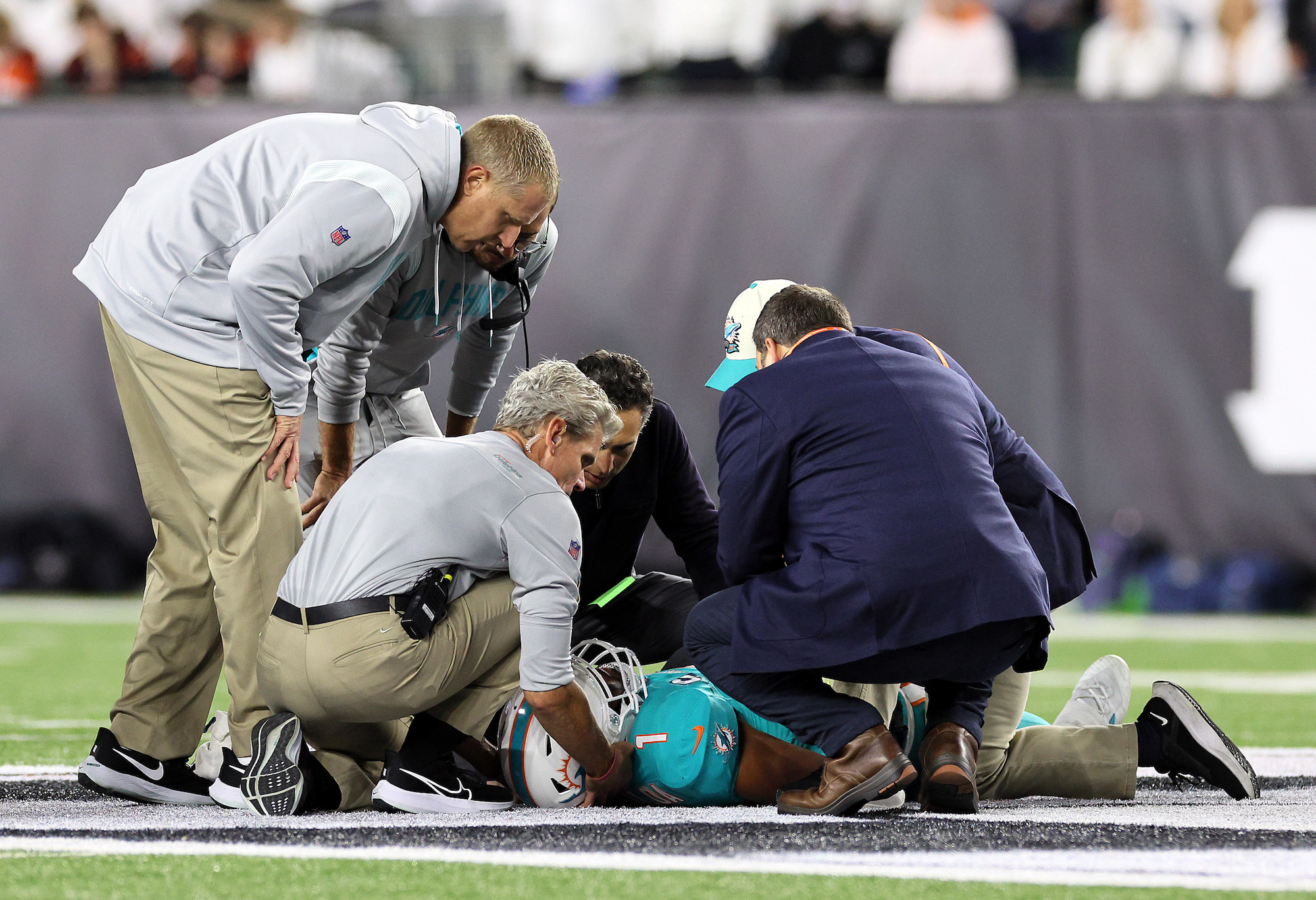Brain injuries are delicate and complex, but there are a few things about them we do know. We know that it's possible for symptoms to be delayed, or to come and go, making it entirely plausible that Tua Tagovailoa could pass the short-term concussion protocol on Sunday but still be very much not all right. We know that physical activity before one has completely recovered from one concussion makes a second concussion more likely, and that the effects of a second concussion in such rapid succession will be more severe.
We also know, from having seen it too many times, what the fencing response means:
Prayers for Tua. He was just carted off the field 🙏 pic.twitter.com/HPv03iqWMU
— allfootball (@allfootball_IG) September 30, 2022
Dolphins quarterback Tua Tagovailoa, who was allowed to return to play on Sunday after an obvious concussion was chalked up to a back injury, was out there again four days later for Thursday Night Football, and it didn't take very long for him to hit his head again. Wrapped up and slammed to the turf by Cincinnati's Josh Tupou, Tagovailoa immediately flexed his arms and hands unnaturally, the so-called fencing response that indicates a relatively more serious brain injury and unconsciousness. He was down on the field for about 10 minutes before being wheeled off on a stretcher and taken to the hospital for examination.
Tagovailoa was shortly discharged and is expected to fly back to Miami with the team today. "It's an emotional moment. It's not a part of the deal you sign up for," said Dolphins coach Mike McDaniel about a scary, dangerous, potentially life-ruining head injury that is absolutely part of the deal you sign up for in the NFL.
"His teammates and myself were very concerned," McDaniel continued, "but he got checked out and it's nothing more serious than a concussion." Not to pick on McDaniel, who was speaking extemporaneously, but treating concussions as unserious is exactly how we got here.
The NFLPA, which had already demanded an investigation into the Dolphins' handling of Tagovailoa on Sunday, seems pretty steamed. Executive director De Smith texted a couple players on the executive committee a message that was meant to be made public:
“We insisted on these rules to avoid exactly this scenario. We will pursue every legal option, including making referrals against the doctors to licensing agencies and the team that is obligated to keep our players safe.”
I don't recall seeing the union use language this intense before, but I also don't recall many situations this blatant. Whether or not Tagovailoa passed the little exam in the locker room last weekend, he should not have been back on the field. Per the concussion protocols, if a players shows "gross motor instability"—and him stumbling and having to be held erect on Sunday certainly counts—both the Dolphins team physician and the "unaffiliated" consultant have to be satisfied that the instability had a cause that was not neurological for Tagovailoa to return to action. How did they conclude that? What led them to accept that what was so obvious to anyone watching was actually a lower back injury? There are questions to be asked of Mike McDaniel, too. Even if he had been assured by doctors last weekend that Tagovailoa stumbling around the field was not related to a brain injury, he still saw what we all saw. Why didn't his own common sense kick in to keep his star quarterback off the field on Thursday night? How can he possibly believe this?
These are the questions the NFLPA wants answered. But if there's one more thing about brain injuries that we already know, it's that the NFL's entire apparatus for dealing with them, wrung painfully and with many casualties via legal action after decades of cover-ups and willful ignorance, will still always err on the side of putting players back on the field. Especially the most important and talented ones; players aren't worth anything to the NFL if they're not playing, after all. If the league's experts pretended not to know what was going on in Tua Tagovailoa's head last weekend, it's not hard to figure out what was in theirs.






